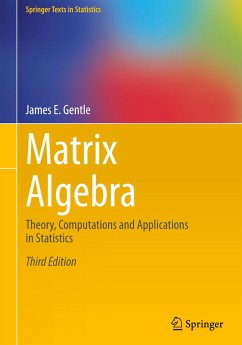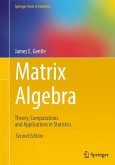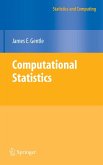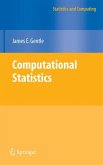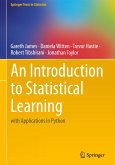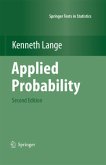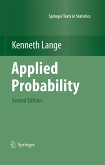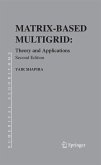This book presents the theory of matrix algebra for statistical applications, explores various types of matrices encountered in statistics, and covers numerical linear algebra. Matrix algebra is one of the most important areas of mathematics in data science and in statistical theory, and previous editions had essential updates and comprehensive coverage on critical topics in mathematics.
This 3rd edition offers a self-contained description of relevant aspects of matrix algebra for applications in statistics. It begins with fundamental concepts of vectors and vector spaces; covers basic algebraic properties of matrices and analytic properties of vectors and matrices in multivariate calculus; and concludes with a discussion on operations on matrices, in solutions of linear systems and in eigenanalysis. It also includes discussions of the R software package, with numerous examples and exercises.
Matrix Algebra considers various types of matrices encountered in statistics, such as projection matrices and positive definite matrices, and describes special properties of those matrices; as well as describing various applications of matrix theory in statistics, including linear models, multivariate analysis, and stochastic processes. It begins with a discussion of the basics of numerical computations and goes on to describe accurate and efficient algorithms for factoring matrices, how to solve linear systems of equations, and the extraction of eigenvalues and eigenvectors. It covers numerical linear algebra-one of the most important subjects in the field of statistical computing. The content includes greater emphases on R, and extensive coverage of statistical linear models.
Matrix Algebra is ideal for graduate and advanced undergraduate students, or as a supplementary text for courses in linear models or multivariate statistics. It's also ideal for use in a course in statistical computing, or as a supplementary text forvarious courses that emphasize computations.
This 3rd edition offers a self-contained description of relevant aspects of matrix algebra for applications in statistics. It begins with fundamental concepts of vectors and vector spaces; covers basic algebraic properties of matrices and analytic properties of vectors and matrices in multivariate calculus; and concludes with a discussion on operations on matrices, in solutions of linear systems and in eigenanalysis. It also includes discussions of the R software package, with numerous examples and exercises.
Matrix Algebra considers various types of matrices encountered in statistics, such as projection matrices and positive definite matrices, and describes special properties of those matrices; as well as describing various applications of matrix theory in statistics, including linear models, multivariate analysis, and stochastic processes. It begins with a discussion of the basics of numerical computations and goes on to describe accurate and efficient algorithms for factoring matrices, how to solve linear systems of equations, and the extraction of eigenvalues and eigenvectors. It covers numerical linear algebra-one of the most important subjects in the field of statistical computing. The content includes greater emphases on R, and extensive coverage of statistical linear models.
Matrix Algebra is ideal for graduate and advanced undergraduate students, or as a supplementary text for courses in linear models or multivariate statistics. It's also ideal for use in a course in statistical computing, or as a supplementary text forvarious courses that emphasize computations.
"Gentle has put in a lot of time and effort to writing this book with careful attention to details. ... it is all needed to make sure the student has a firm and solid understanding of matrix algebra on the graduate level. I would recommend this book for all those who teach graduate level matrix algebra or ... to those undergraduate students who wish to have an independent study." (Peter Olszewski, MAA Reviews, January, 2018)
"Beautifully written, easy to read, with a well subindexed index of 16 pages and a bibliography of 13 that includes most modern and relevant textbooks and articles in the area of matrix theory and computations, as well as for statistics and big data computations." (Frank Uhlig, zbMATH 1386.15002, 2018)
"This very reader-friendly written volume presents an opportunity to graduate students and researchers to enjoy reading on the classical matrix analysis in its modern applications to statistics and to implement thesemethods in practical problem solving." (Stan Lipovetsky, Technometrics, Vol. 60 (2), 2018)
"Beautifully written, easy to read, with a well subindexed index of 16 pages and a bibliography of 13 that includes most modern and relevant textbooks and articles in the area of matrix theory and computations, as well as for statistics and big data computations." (Frank Uhlig, zbMATH 1386.15002, 2018)
"This very reader-friendly written volume presents an opportunity to graduate students and researchers to enjoy reading on the classical matrix analysis in its modern applications to statistics and to implement thesemethods in practical problem solving." (Stan Lipovetsky, Technometrics, Vol. 60 (2), 2018)

